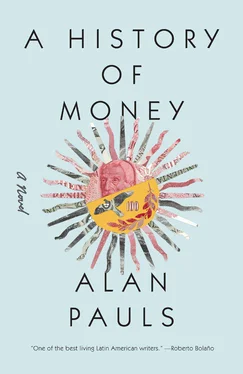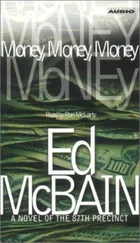That’s the kind of rain she’s hoping for. But will it ever come, if she hopes for it so desperately? Will it ever come, if it’s less rain than late payments, the type of delayed satisfaction that no creditor ever truly forgets, even if only because they’ve made a note of it somewhere in their little book of debtors? Conquering her reserve about telling people of her change of lifestyle, she circulates the address and telephone number of the hotel she’s living in. Among the calls she receives, which she gaily filters through the hotel’s reception, there’s only one she doesn’t recognize. She repeats the name aloud and searches for it fruitlessly in her address book. She asks a couple of the old friends who over time have become emergency memory sources. Nobody remembers it. It’s unknown, faceless, untraceable, and impossible to pin down. “This is it,” she thinks. This is the secret: that there are no clouds or thunderclaps; that the rain truly comes from the beyond. She gathers her courage (a siesta, a shower, two glasses of cognac, three lines of written prompts on how to sound surprised, what tone of voice she should use, and how thankful she should be) and makes the call. It’s answered by a nasal voice that thins every now and then into a dramatic and artificial-sounding falsetto. He blurts out her married name — the excitement of getting a callback, no doubt — and then tries to cover the slip by coughing until he realizes that he doesn’t know her maiden name. He’s a former stockbroker. He used to manage — quite solvently — some shares his mother bought on her ex-husband’s advice (and then sold at a loss between the Ecolodge Period and Time-share Mark II, in order to replace all the flooring in the Beast). He’s set up on his own now, still in finance. He’s offering some very advantageous opportunities, and going through his portfolio of good former clients … Might they meet up for a coffee? He got her new number from her ex-husband. Incidentally: What’s all this about living in a hotel?
Though she dreams of a downpour of money, he’s the one who ends up getting wet. His father dies. One night he waits for the nurses to make their last rounds, unplugs his tubes and wires (the morbid pleasure of the tape crackling as it comes away), and crosses over to the room opposite in his bare feet and orange robe, where a former Boca Juniors midfielder hooked up to a dialysis machine is waiting to play poker with him. The night nurse — the tall, severe one who doesn’t accept tips — finds him in a chair next to the midfielder’s bed, very rigid, with three sevens in one hand, his head leaning slightly to the left in an attitude of elegant mistrust, and the other hand resting on the edge of a table on wheels that’s serving as a makeshift baize, where the deck (with the seven of clubs on top) and a plastic cup containing two fingers of whiskey sit waiting for him.
The coffin shrinks him and makes him look ugly. A very long white hair comes out of his mustache, does a double somersault, and embeds itself in the side of his upper lip, very close to the corner of his mouth. Has his beard been trimmed? He argues with someone who works at the funeral parlor about the shroud they’ve put on him, which is made of white linen and very similar to the one they used at the hospital because they didn’t have anything else, only more sheer, almost transparent, a ridiculous, feminine little piece of baby’s clothing that looks as though it belongs on an angel. “Why don’t you give him a harp, too?” he says, and leaves, slamming the door behind him. At one point, when he’s left alone with the body, he leans over his face, takes another close look at the wrinkles on his forehead that he knows so well, and kisses him. The temperature of the body makes him recoil. It’s a cavernous cold, like marble, dense and abysmal; a cold that will never change, that will stay this way forever. His mother, who to his surprise is the first to arrive and the only guest who takes the starting time to heart, stands up throughout the whole service, keeping her vigil with her umbrella and purse in hand. Out of loyalty to the old law of punctuality and stoicism as means of sharing in others’ pain, she refuses a seat and rejects water, coffee, and the repulsive mints that a gaunt raven in a suit brings around every now and then on a plate, with his other arm folded gently against his back like a waiter at a pretentious restaurant.
There aren’t many people at the wake; most of their faces are hazy, and though they signal to him determinedly from someplace in the past, he doesn’t recognize them. Acquaintances. His father spent his life surrounded by transitory, furtive people, whose ties to him were always circumstantial or contingent. He tries to remember who they remind him of while he accepts their hugs, pats on the back, and distressed or encouraging words. He recognizes a couple of employees from the agency; the now decidedly obese money changer who used to change his dollars while the house was being renovated; the doorman from a building in Belgrano where he’d get trapped in the elevator on two out of every three visits; the blond, slightly wall-eyed woman from Air France or Alitalia, who would always point at him when he accompanied his father on his payment rounds as a boy and ask if he could make one like that for her. When the time comes, though, it’s not these guests but rather five doleful strangers — one of whom has a deep tan and tries to stifle an attack of allergies by pressing a handkerchief to his nose — who help him to carry the coffin, while the undertakers’ cars double park and everyone disperses into clusters of dark sadness, some following the procession to the cemetery, others leaving. His mother leaves. She gives him one last hug, jabbing him slightly between the shoulder blades with the handle of her umbrella, and he suddenly breaks down in tears like a little boy; he breaks just like a little boy when he cries. In the arms of that shrunken body, which he would never have believed could contain him, he’s struck for the first time by the certainty that he is the only tie there ever was between his mother and his father. She dries the tears from his face with a finger, tells him that the cremation would be too much for her, and asks him for twenty pesos for a taxi.
Doors slam shut, engines start up, a gear stick groans, there’s a monosyllabic froth of goodbyes. Normality — a red light, a cleaning-supply store open for business, a woman sweeping her balcony with a shawl on her head — pierces him like a scandal. Someone removes the white letters spelling out his father’s name on a sign made of black cloth and replaces them with different ones. G-R-O-L-M-A-N, they say. He could swear it should be a double n . Mr.? Mrs.? He’ll have to come back at three, when the Grolman service starts, to check. He looks for something or someone to tell him what to do, what to say, where to go: a sign, an instruction manual, one of those promotions girls in tight skirts and too much makeup who can show you how to get a loan or configure the latest phones in the space of two minutes. How can “how to behave at your parents’ funerals” possibly not be a compulsory class at school? An open door appears in front of him, and without thinking about it he ducks into a car that smells of leather, leather so fragrant it seems fake. They wait for a few minutes. There’s a trio of ravens deliberating next to the car in front, the one carrying the coffin. The driver of his car has protruding ears, very short hair, and a string of tiny warts across the back of his neck. He distracts himself by looking at the tinted city, now as dull and dark and muffled as on a cloudy winter’s evening. His eyelids are heavy and his body feels numb, like it’s been padded with layers of damp wool. He’s suddenly grazed by a very old memory of his father: he’s fallen asleep watching TV with his mouth wide open and is snoring at a cartoonishly high volume, as though there’s some kind of broken machine stuffed up his nose. He’d so like to fall asleep. In fact, he is beginning to sleep, to dream — a point-of-view shot of his hand grabbing a handle, a door leading to a garden carpeted with water, the cawing of a sort of paper toucan that flaps its wings as it passes — when the door opens and into the seat beside him, as delicately as if he were invisible or a part of his dream, slips the stranger who sneezed while carrying the coffin.
Читать дальше












